KFOR withdraws from Serb barricades in north
A day-long standoff on Friday between KFOR soldiers and Serbs blocking a road in northern Kosovo ended with the withdrawal of the troops from the barricades.
Friday, 29.07.2011.
09:46

A day-long standoff on Friday between KFOR soldiers and Serbs blocking a road in northern Kosovo ended with the withdrawal of the troops from the barricades. KFOR commander Erhard Buehler said earlier this afternoon the previously scheduled meeting with Serbian officials in Rudare would not take place unless local Serbs removed their barricades from a nearby road, but after negotiations with Serbian officials that lasted three and a half hours, the NATO-led troops withdrew from the location. KFOR withdraws from Serb barricades in north They arrived there earlier today in reportedly a bid to reach the checkpoint of Jarinje, and threatened to use force in order to remove those protesting. However, about 100 Serbs barricading the road seemed steadfast in their decision not to move. Tanjug reported that the number later grew to about 1,000 people, including local municipal officials and Serbian Orthodox priests, as well as Minister for Kosovo Goran Bogdanovic and his State Secretary Oliver Ivanovic. Addressing the Serbs after the talks resulted in KFOR's withdrawal, Borislav Stefanovic - who heads the Belgrade team in the Kosovo dialogue held in Brussels - said that the agreement on administrative crossings themselves was yet to be reached, but that top state officials, governments of other countries and international institutionswere engaged on the issue, "so the agreement is near". Reporting after 16:00 CET from Brussels news agencies said that NATO "rejected claims that it supports only one side in the crisis in Kosovo". NATO also "made it clear that its mission in Kosovo will continue to act in a status-neutral manner and will not implement any agreement that does not have the backing of both Serb and Kosovo Albanian side". Yesterday, Serbian officials said they were told during the negotiations that KFOR received orders to "implement decisions of the government in Pristina". American KFOR troops today closed the Jarinje checkpoint by placing barbed wire across the road, and a chair with a cardboard reading, "passage prohibited, turn back". There was no explanation for the move, but reporters believe it came after a KFOR convoy headed toward Jarinje was blocked near Rudare. Jarinje is the only administrative line post through which Serbs in northern Kosovo receive their supplies. During Wednesday, KFOR also closed off Brnjak, cutting off northern, predominantly Serb areas of Kosovo. The NATO-led mission was accused by Serbia's Borislav Stefanovic on Thursday of stepping outside the UN Security Council Resolution 1244 - which provides its mandate - while KFOR Commander Erhard Buehler declared two administrative line checkpoints in the Serb north "restricted military zones", and threated use of "deadly force" to protect that status. At the military airport in Nis, his deputy and deputy of the Serbian Army chief held a meeting later in the day. The negotiations between Stefanovic, Goran Bogdanovic - who on Thursday accused KFOR of aiding the creation of "an independent state of Kosovo" - and Buehler were aimed finding a solution for the future functioning of the Jarinje and Brnjak posts, in the wake of the Pristina government attempts to take them over by sending police units. For now, Jarinje is controlled by KFOR troops, while they are present at Brnjak along with "mixed Serb-Albanian KPS patrols", says our reporter. Last night, local Serbs decided to spend another night at the barricades they set up to prevent movement of KPS units, and said they would defend them "with their bodies". Kosovska Mitrovica Mayor Krstimir Pantic and Zvecan Mayor Dragisa Milovic said that should KFOR try to forcibly remove the road blocks, they would be "the first to lie in front of KFOR vehicles". The Serbs said that they would block all roads in northern Kosovo for a period of 24 hours if the talks expected to continue today failed. They are demanding a return to the regime that existed at the checkpoints before Pristina's attempts to take them over and impose a ban on goods arriving from central Serbia. A Serb woman faces KFOR troops and holds up a rose at the Rudare barricade (Beta) Serbs sit in to prevent passage of KFOR Serbs from Zvecan and Kosovska Mitrovica, who have been blocking the road near the village of Rudare for four days in a row, have decided Friday to sit in the road, and thus prevent 15 armoured vehicles of German KFOR contingent from moving from Leposavic to Pristina. The German contingent returned to Leposavic. A crisis center has been established for the municipalities of Zvecan and Kosovska Mitrovica, which will later during the day give an assessment of the current situation in northern Kosovo. Serbs blocking the road in Zvecan are appalled by the fact that the Kosovo government started imposing its embargo on goods from Serbia at the Brnjak checkpoint. On the major road connecting Kosovska Mitrovica-Leposavic-Raska, Serbs have mounted several blockages, the largest near the village of Rudare. That blockage is made up of hard machinery, while on the very road Serbs unloaded gravel and timber. The passenger traffic is running smoothly, but the vehicles of KFOR and the Kosovo Police Service are not allowed to pass.
KFOR withdraws from Serb barricades in north
They arrived there earlier today in reportedly a bid to reach the checkpoint of Jarinje, and threatened to use force in order to remove those protesting.However, about 100 Serbs barricading the road seemed steadfast in their decision not to move.
Tanjug reported that the number later grew to about 1,000 people, including local municipal officials and Serbian Orthodox priests, as well as Minister for Kosovo Goran Bogdanović and his State Secretary Oliver Ivanović.
Addressing the Serbs after the talks resulted in KFOR's withdrawal, Borislav Stefanović - who heads the Belgrade team in the Kosovo dialogue held in Brussels - said that the agreement on administrative crossings themselves was yet to be reached, but that top state officials, governments of other countries and international institutionswere engaged on the issue, "so the agreement is near".
Reporting after 16:00 CET from Brussels news agencies said that NATO "rejected claims that it supports only one side in the crisis in Kosovo".
NATO also "made it clear that its mission in Kosovo will continue to act in a status-neutral manner and will not implement any agreement that does not have the backing of both Serb and Kosovo Albanian side".
Yesterday, Serbian officials said they were told during the negotiations that KFOR received orders to "implement decisions of the government in Priština".
American KFOR troops today closed the Jarinje checkpoint by placing barbed wire across the road, and a chair with a cardboard reading, "passage prohibited, turn back".
There was no explanation for the move, but reporters believe it came after a KFOR convoy headed toward Jarinje was blocked near Rudare.
Jarinje is the only administrative line post through which Serbs in northern Kosovo receive their supplies.
During Wednesday, KFOR also closed off Brnjak, cutting off northern, predominantly Serb areas of Kosovo.
The NATO-led mission was accused by Serbia's Borislav Stefanović on Thursday of stepping outside the UN Security Council Resolution 1244 - which provides its mandate - while KFOR Commander Erhard Buehler declared two administrative line checkpoints in the Serb north "restricted military zones", and threated use of "deadly force" to protect that status.
At the military airport in Niš, his deputy and deputy of the Serbian Army chief held a meeting later in the day.
The negotiations between Stefanović, Goran Bogdanović - who on Thursday accused KFOR of aiding the creation of "an independent state of Kosovo" - and Buehler were aimed finding a solution for the future functioning of the Jarinje and Brnjak posts, in the wake of the Priština government attempts to take them over by sending police units.
For now, Jarinje is controlled by KFOR troops, while they are present at Brnjak along with "mixed Serb-Albanian KPS patrols", says our reporter.
Last night, local Serbs decided to spend another night at the barricades they set up to prevent movement of KPS units, and said they would defend them "with their bodies".
Kosovska Mitrovica Mayor Krstimir Pantić and Zvečan Mayor Dragiša Milović said that should KFOR try to forcibly remove the road blocks, they would be "the first to lie in front of KFOR vehicles".
The Serbs said that they would block all roads in northern Kosovo for a period of 24 hours if the talks expected to continue today failed. They are demanding a return to the regime that existed at the checkpoints before Priština's attempts to take them over and impose a ban on goods arriving from central Serbia.
Serbs sit in to prevent passage of KFOR
Serbs from Zvečan and Kosovska Mitrovica, who have been blocking the road near the village of Rudare for four days in a row, have decided Friday to sit in the road, and thus prevent 15 armoured vehicles of German KFOR contingent from moving from Leposavić to Priština.The German contingent returned to Leposavić.
A crisis center has been established for the municipalities of Zvečan and Kosovska Mitrovica, which will later during the day give an assessment of the current situation in northern Kosovo.
Serbs blocking the road in Zvečan are appalled by the fact that the Kosovo government started imposing its embargo on goods from Serbia at the Brnjak checkpoint.
On the major road connecting Kosovska Mitrovica-Leposavić-Raska, Serbs have mounted several blockages, the largest near the village of Rudare.
That blockage is made up of hard machinery, while on the very road Serbs unloaded gravel and timber.
The passenger traffic is running smoothly, but the vehicles of KFOR and the Kosovo Police Service are not allowed to pass.










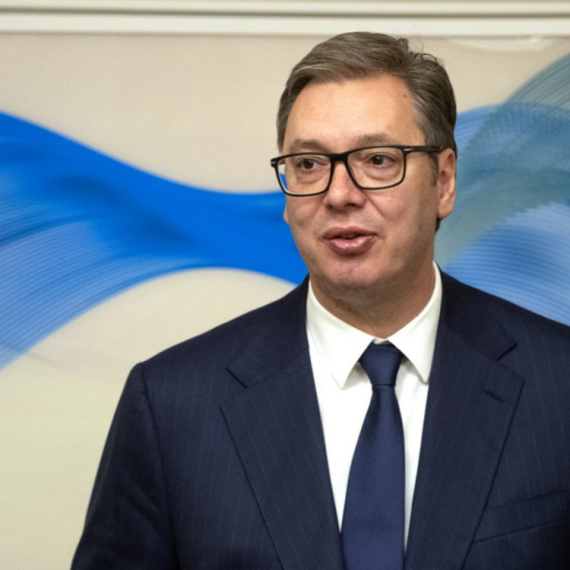

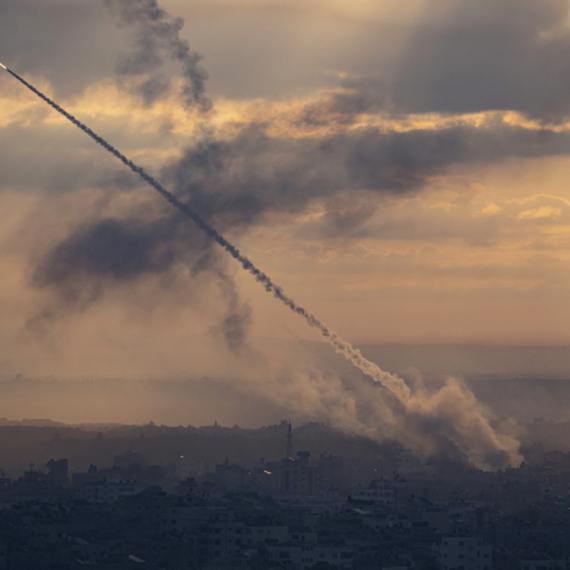
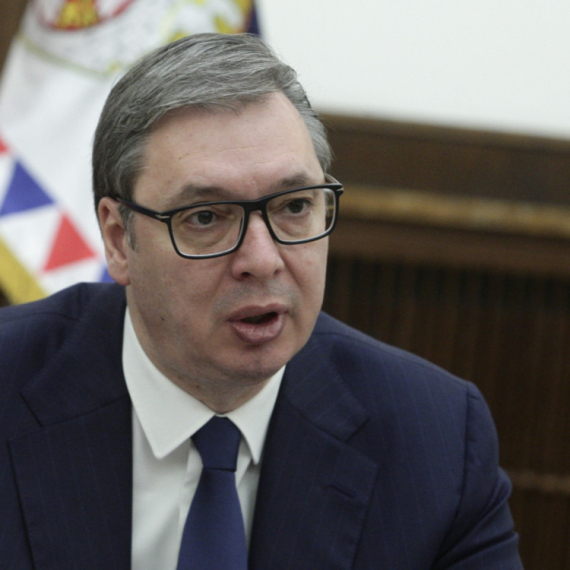

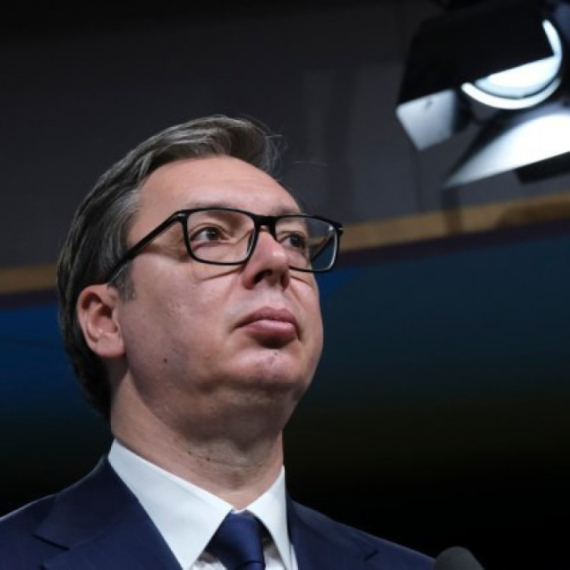



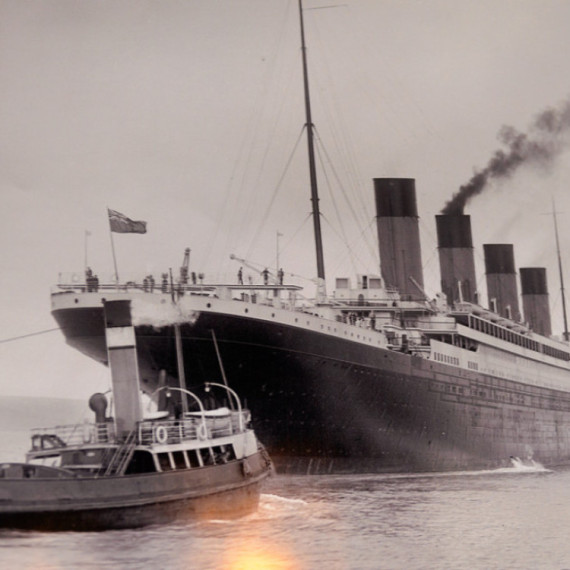

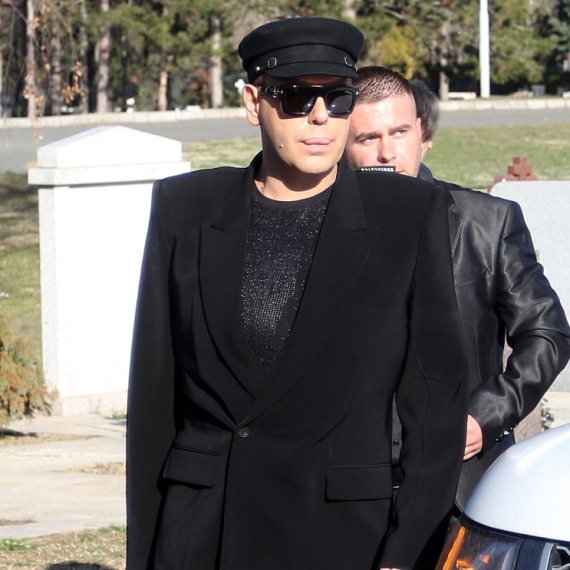


































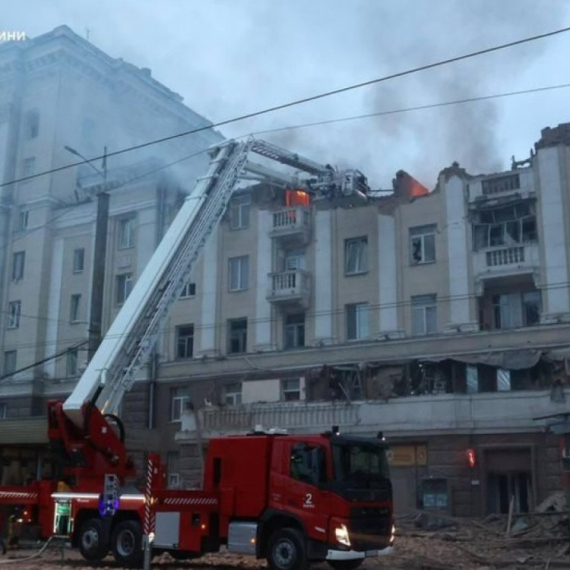

Komentari 46
Pogledaj komentare